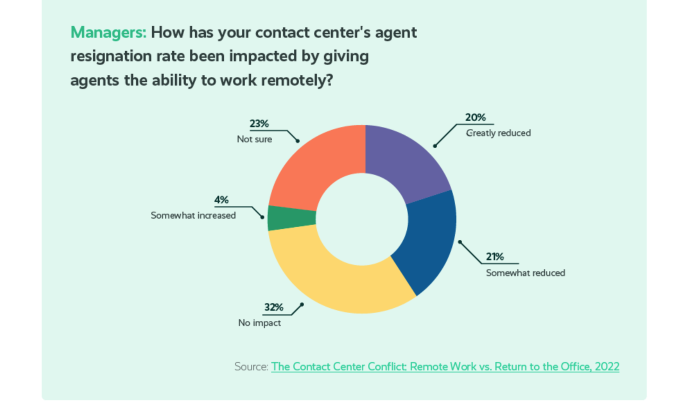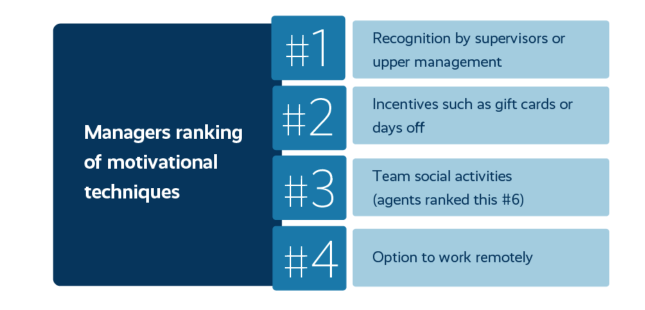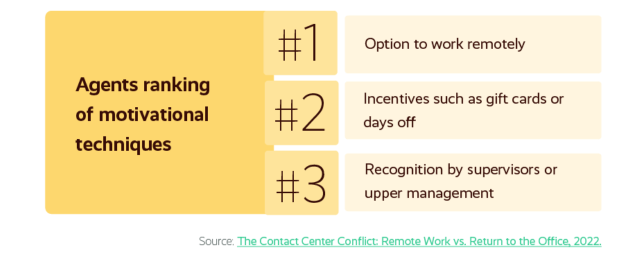
Quarterly Publication of the Quality Assurance & Training Connection
5 Ways Contact Center Managers are Adapting to Remote Work
By Donna Lightfoot, Playvox
Research in 2022 shows that 70% of agents say that working remotely has improved their job satisfaction, and 56% of respondents say they’d consider leaving their jobs if they couldn’t work remotely.
While agents have been explicit in their desire to continue remote working, nearly half of the contact center managers in our survey are planning to bring agents back to an office in 2022. That’s a dangerous disconnect.
The other interesting data point is that even while leaders of support centers are looking to bring agents back to a physical customer care center, they’ve also indicated a strong preference for staying remote themselves. Over half the managers we surveyed told us they work remotely five days per week, and the overwhelming majority (84%) said they were happy with that.
How to Adapt to Remote Work
Working remotely is a plus for everyone involved, but it’s an adjustment and requires a different approach than what customer care managers use when everyone is in a single location. Our survey uncovered five ways contact center managers are adapting to remote work.
1. Adopt New Management Styles
Sixty-four percent (64%) of managers in our survey say their contact center has been extremely or very successful in supporting remote agents. If you’d like to stay (or go) remote with your team, our respondents have some advice to share:
- Offer appropriate technology for agents to do their jobs
- Schedule regular communication and team-building activities
- Provide good benefits
- Promote a positive work-life balance and support job flexibility (Seventy-six percent [76%] of agents say they like having more control over their time with remote work.)
- Create a remote-first policy and a high level of trust
“We pay well, and we schedule two stand-up meetings daily to maintain face-to-face contact.
We also manage the team with the utmost respect.”
–Leanne Y., a contact center manager at a fitness company
2. Set Up the Right Policies
Even with 60% of contact centers working in a hybrid model and 40% working entirely remote, many (42%) of the contact centers we surveyed are doing it without solid policies in place to govern how agents should work.
The hasty scramble to set up agents to work remotely amid the pandemic might be the culprit, but more than two years down the line, it’s time to create a plan.
Some of the contact centers that do have a remote work policy shared a bit about what they include:
- “If the agent lives more than 30 miles from the office, they are considered to be permanently remote. Everyone else works in the office two days per week and remotely three days per week. New hires must complete their first six months in the office, five days per week. Anyone not performing to satisfaction will be required to report to the office five days per week until metrics are maintained.”
- “Agents must meet certain performance standards. For administrative or support roles, they get one day a week to work remotely.”
- “They need to be in good standing, such as meeting work expectations, and must have been in their role for one year.”
- “Our remote work policy focuses on the environment they will work in, such as having a quiet room and clean desk, consenting to video recording, etc.”
3. Keep More Agents On Board
The Great Resignation isn’t over, and the trend can be especially tough in a high-turnover industry like contact centers and support centers. But remote work is a surefire way to hang on to the agents you’ve spent so much time and money training — and who have become such valuable members of your team.
Our research found that supporting working remotely reduces resignation rates and helps you keep your agents. Forty-one percent (41%) of support managers we talked to say giving agents the ability to work remotely has either greatly or somewhat reduced their resignation rates.
4. Attract and Recruit New Agents
Research from ICMI tells us that contact center agents stay in those roles for about two years, so hiring will always be a big part of your job. But remote work is a great tool to attract new hires.
In the past year, 49% of managers in our survey say they’ve offered prospective agents the ability to work remotely. That’s a smart move, especially since the agents in our survey ranked the option to work remotely as the #1 motivator at work. (Managers ranked it #4.)
5. Find New Ways to Engage Remote Agents
You might be concerned about missing opportunities to connect with your team and build relationships, both as a group and individually. Lack of engagement can be a disadvantage of remote work, but it doesn’t have to be. The responsibility for keeping these relationships alive falls on you as a contact center leader.
“We give unlimited paid time off to facilitate a positive work-life balance, schedule remote happy hours to promote team comaraderie, and offer random, fun team competitions facilitated by team members.”
–Philip A., a manager at an online learning organization
When it comes to engaging with your remote team, make sure you’re encouraging activities that build team spirit. Open chats in Slack can help keep communication going among your team and frequent Zoom meetings are a must.
But also try other tactics like gamification — for training or just for fun. You can use a tool like Kahoot! for entertaining activities like a trivia challenge, and for work-related training, you can use a motivation solution that offers leaderboards and badges to encourage healthy competition.
When you have a remote or hybrid team, it’s important to build individual relationships with your team members to keep them engaged. As Kimberly C., a manager at a nonprofit organization, tells us, “You have to increase interaction time with your employees. Whatever you were doing in the office must increase two- or threefold.”
Some of the hesitation around remote work in contact centers is about not knowing how agents spend their time if you’re not in the same building. Solutions like Playvox Workforce Engagement Management can help you not only ensure you have a clear view of agents’ performance but also monitor quality, as well as train and motivate your team.
Make Working Remotely Work for Your Contact Center
Offering remote work is a must for contact centers that want to attract and retain top-quality agents. The last few years have shown us that it works well for everyone — if you have the right policies and technologies in place.
Learn more about how other contact center leaders are handling remote work — and how agents feel about it — in our free, fresh-off-the-presses eBook, The Contact Center Conflict: Remote Work vs. Return to the Office. Download the eBook at https://www.playvox.com/ebooks/the-contact-center-conflict-remote-work-vs-return-to-the-office/.
Donna Lightfoot is a Product Marketing Manager at Playvox with 15 years of workforce management experience including implementing WFM and measuring increased productivity and reduced costs. Donna lives in Bentonville, Arkansas, where she enjoys candle making, baking, and spending time with her family.
Playvox’s powerfully simple Workforce Engagement Management solutions transform customer care. We understand that exceptional employee engagement produces extraordinary customer experiences, and we love creating solutions that help our customers unlock the full potential in every employee and every interaction. Playvox powers the world’s fastest-growing brands and proudly serves expanding digital experience pioneers such as Noom, NuBank, SoFi, Stitch Fix, Twitter and Zendesk. Our agent-empowering suite of scheduling, performance, learning, quality feedback and gamification lives seamlessly in the modern support operations ecosystem with platforms like Amazon Connect, Kustomer, Salesforce, Slack, and Zendesk. Learn more at www.playvox.com.



